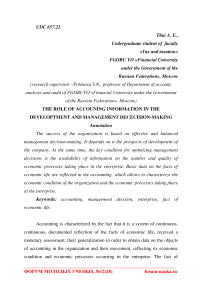The role of accounting information in the development and management decision-making
Автор: Thai A.E., Polenova S.N.
Журнал: Форум молодых ученых @forum-nauka
Статья в выпуске: 12-1 (28), 2018 года.
Бесплатный доступ
The success of the organization is based on effective and balanced management decision-making. It depends on it the prospects of development of the company. At the same time, the key condition for optimizing management decisions is the availability of information on the number and quality of economic processes taking place in the enterprise. Basic data on the facts of economic life are reflected in the accounting, which allows to characterize the economic condition of the organization and the economic processes taking place at the enterprise.
Accounting, management decision, enterprise, fact of economic life
Короткий адрес: https://sciup.org/140280743
IDR: 140280743
Текст научной статьи The role of accounting information in the development and management decision-making
Accounting is characterized by the fact that it is a system of continuous, continuous, documented reflection of the facts of economic life, received a monetary assessment, their generalization in order to obtain data on the objects of accounting in the organization and their movement, reflecting its economic condition and economic processes occurring in the enterprise. The fact of economic life is a transaction, event, operation that have an impact on the financial position of the company, the financial result of its activities and cash flows.
Accounting includes the main elements:
-
- documentation (primary registration of the facts of economic life by means of certain documents);
-
- accounts (synthetic and analytical);
-
- double entry (a method of reflecting the fact of economic life in the accounts, in which the amount of each transaction is recorded on two interrelated accounts-debit one and credit another account);
-
- inventory (check of compliance of the actual availability of property to accounting data);
-
- valuation (expressed in monetary terms of the company's economic performance);
-
- calculation (classification of costs and calculation of the cost of production, works, services);
-
- balance sheet (generalization and grouping of assets of the organization and sources of their formation in monetary terms on a certain date);
-
- reporting (a system that reflects the property and financial position of the organization and the results of its economic activities).
The above elements of the accounting method allow the accountant to clearly express the economic condition of the enterprise, to find out the causes of financial failures and to determine the current factors of development of the organization.
To understand what role accounting plays in the modern enterprise management system it is necessary to present its functions.
Control function allows to carry out systematic control of production, economic and financial activity of the organization, compliance of reflection of the perfect facts of economic life to the accounting legislation, their legality, safety of property, prevention of illegal actions.
The information function is related to the fact that accounting data are used at all levels of management in the organization, as well as at different levels of management of the national economy as a whole, its branches and departments.
The function of ensuring the safety of property is traditional for accounting in any organization since ancient times, regardless of the socioeconomic formation in which the activity is carried out.
The feedback suggests that coming from a management object data through accounting is converted from an unordered information in accounting information.
The analytical function of accounting is manifested by documenting and reflecting all the facts of economic life with both economic and legal consequences. The identification and analysis of deviations that negatively affect the performance of the organization, the development of measures to eliminate negative manifestations in the economy of the organization can improve financial results, consolidate positive trends in activity.
Having considered the main functions of accounting, we can say that accounting acts as a link connecting economic activities and decision makers. Typically, management decisions are made by internal users of accounting information. Accounting data are used to assess the property and financial position of the organization, as well as forecasting and planning of its activities, substantiation of strategy and management tactics, control of implementation of plans, development of a set of measures to develop, strengthen financial stability and position in the market of goods and services.
It can be concluded that accounting is an important part of every enterprise. It is necessary to reflect the results of financial and economic activities of the organization, which are necessary for users of accounting information. On the basis of these data, internal users (accountants, managers, marketers and other specialists) prepare reports on the activities of the enterprise and submit it to its shareholders, the management of the organization and other users. In turn, management, specifically presenting the current financial and property situation of the organization, can make management decisions that contribute to either increase profits from sales and other activities, or reduce the cost of production and sale of products, works, services and other expenses of the enterprise.
Список литературы The role of accounting information in the development and management decision-making
- Федеральный закон «О бухгалтерском учете» от 06.12.2011 N 402-ФЗ (в ред. Федеральных законов от 28.06.2013 № 134-ФЗ, от 02.07.2013 № 185-ФЗ, от 23.07.2013 № 251-ФЗ, от 02.11.2013 № 292-ФЗ, от 21.12.2013 № 357-ФЗ, от 28.12.2013 № 425-ФЗ, от 04.11.2014 № 344-ФЗ, от 23.05.2016 № 149-ФЗ, от 18.07.2017 № 160-ФЗ) // URL: // https://www.minfin.ru/ru/document/?id_4=15014
- Агеева О.А. Бухгалтерский учет и анализ: учебник для академического бакалавриата / О.А. Агеева, Л.С. Шахматова. - Люберцы: Юрайт. 2016. - 509 c.
- Миславская Н.А. О развитии российской системы бухгалтерского учета // Международный бухгалтерский учет. 2009. № 12(132). С.10-13.
- Миславская Н.А., Поленова С.Н. Бухгалтерский учет: учебник. М.: Издательско-торговая корпорация «Дашков и К°». 2014. - 592 с.
- Поленова С.Н. Теория бухгалтерского учета: учебник. М.: Издательско-торговая корпорация «Дашков и К°». 2013. - 464 с.
- Современный бухгалтерский учет и его проблемы: монография / под ред. В.Г. Гетьмана, У.Ю. Блиновой, Л.Н. Герасимовой. М.: Финуниверситет. 2014. - 142 с.


